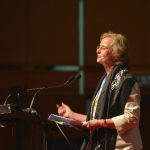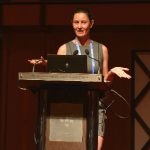KUALA LUMPUR , 23 AUGUST 2016 – Women Antarctic Researchers were celebrated in a speacial occasion namely “Women in Antarctic-Wikibomb Event” which was held in conjucntion with 34th SCAR Biennial Meetings including the 2016 Open Science Conference, 20-30 August 2016.
This is an international effort lead by Scientific Committee on Antarctic Research (SCAR) to increase the visibility of these leading and influential role models and as an effort to stimulate girls around the world to pursue science careers.
Leading up to this event, the SCAR invited the community to nominate influential female Antarctic researchers and those involved in supporting research, both past and present to be included on Wikipedia (called a Wikibomb). The response was huge, with 170 nominations from 30 countries. A dedicated team of volunteers, led by Australian Scientist Jan Strugnell and Wikipedia expert Thomas Shafee, has been working to create and update more than 100 referenced biographies to Wikipedia, the world’s largest encyclopaedia. These biographys of these outstanding role models which include Malaysian researchers, Dr Siti Aisah Alias from National Antarctic Research Centre were launched at this event.
SCAR, the Scientific Committee on Antarctic Research, is a committee of ICSU, the International Council for Science, and it is charged with the initiation, promotion and coordination of scientific research in Antarctica. (www.scar.org).
Malaysia is the first Asian country to host the SCAR Biennial Meetings and Open Science Conference. These meetings draw world-wide attention to Antarctic issues and provide an opportunity for scientists from various disciplines and countries to present their work, establish networking and become more involved in SCAR science activities.
SCAR meets every two years to conduct its administrative business at the SCAR Delegates Meeting. The Biennial SCAR Meeting includes three sets of meetings that occur consecutively in even numbered years.







